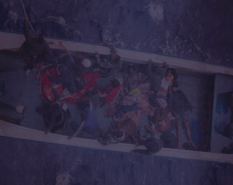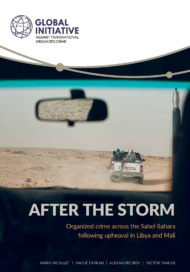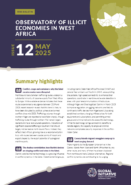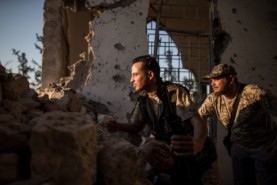Posted on 09 Jun 2020
Every two weeks, we will be looking at corruption, illicit financial flows, gangs, the role of foreign corporations, the political economy of crime, and the enabling environment that has made Africa vulnerable to the growth of organized crime.
Drawing on the Global Initiative Against Transnational Organized Crime’s civil society observatories for North, South, East and West Africa to get a feel for how Organized Crime is impacting some of the world and the continent’s emergency trends and contemporary events.
You’ll hear from GI staff, international experts, civil society networks, partners, and from people working in illicit economies themselves. With more than 150 network members and contacts across the continent, this podcast will be an unparalleled look at the drivers of Africa’s illicit economy.
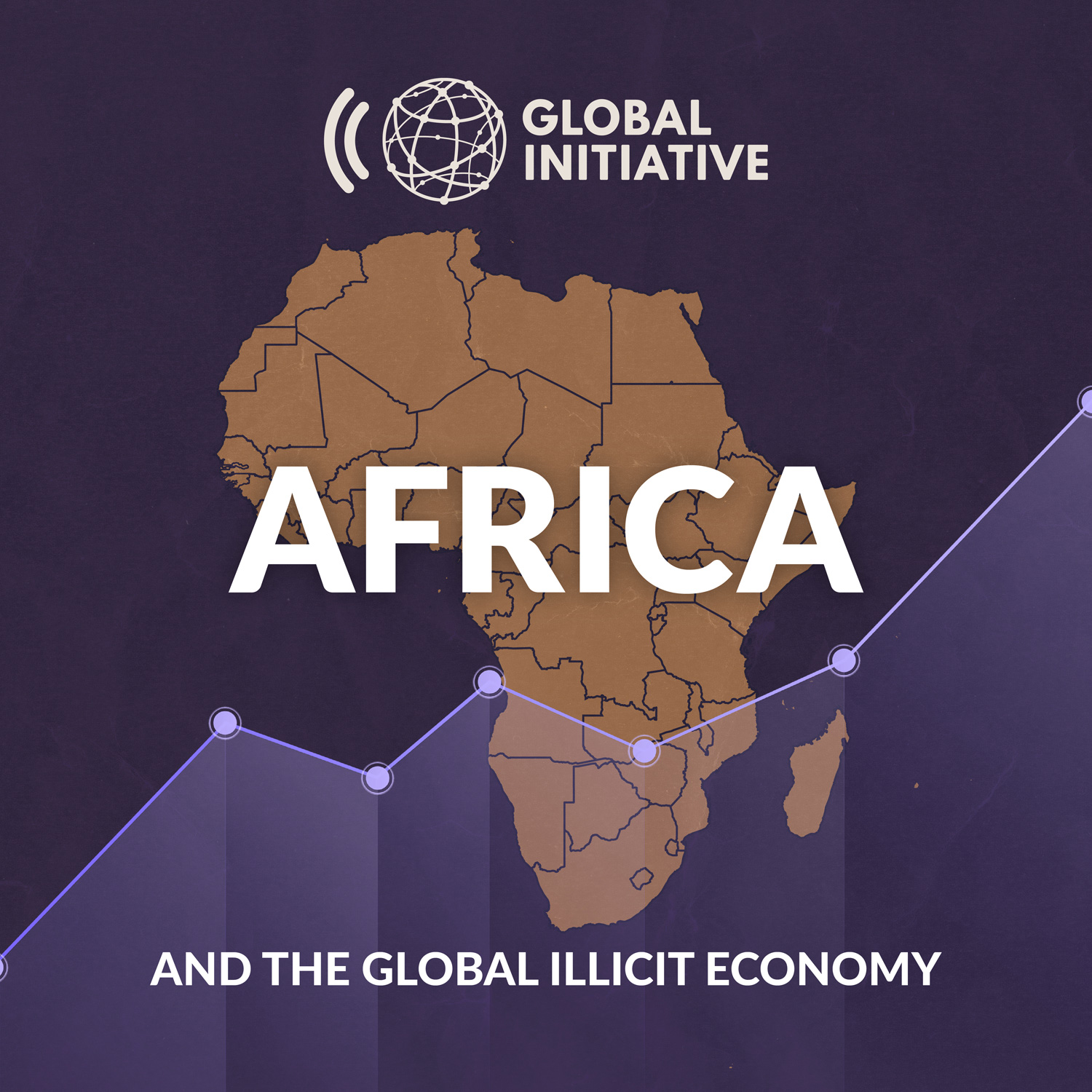
Organized crime in South Africa threatens the economy, its people and the democratic institutions themselves.
Every day we see a number of different and seemingly unconnected criminal incidents taking place - from assassinations to gang rapes in an illegal mining community; and from the violence of the taxi industry to organized cooper theft.
But what lies behind all of these actions is a dark web, a criminal ecosystem driven by an increasingly violent South African underworld.
In this episode Steph Musho talks to Julian Rademeyer, the Director of the East and Southern African Observatory at the Global Initiative Against Transnational Organized Crime about a new and substantial report called 'Assessing South Africa's organized crime risk'.

The Cape Flats in South Africa is made up of 20 suburbs make up the Cape Flats; populated predominantly by black and coloured communities, a term used to describe those of mixed-heritage. Each suburb is marked by poverty, crime, drug abuse, gangsterism and violence.
In this, Lindy Mtongana's final episode, she looks at the Grassy Park where a slew of recent killings has exposed the devastating consequences of territorial battles among the Cape’s most dangerous gangs.
Presenter: Lindy Mtongana
Guests:
Julia Stanyard, Senior Analyst, Observatory for East and Southern Africa, Global Initiative Against Transnational Organized Crime.
Lyndsay Connelly, a community organiser in Grassy Park.
Additional Links:
The Global Organized Crime Index - South Africa

In this episode Lindy delves into the murky world of political assassinations in KwaZulu-Natal, South Africa. Where, according to the GI-TOC's assassination monitor data, for three of the last six years, political assassinations were higher than all other South African provinces combined.
Presenter: Lindy Mtongana
Speaker(s):
Greg Arde, Journalist and Author of War Party: How the ANC’s political killings are breaking South Africa
Chwayita Thobela, Analyst, Global Initiative against Transnational Organized Crime
Thapelo Mohale, a shack dweller, and the secretary general of Abahlali baseMjondolo.
Additional Reading:
Eastern and Southern Africa Observatory - Risk Bulletin
The rule of the gun: Hits and assassinations in South Africa, 2000-2017
Give Us More Guns: How South Africa’s gangs were armed
Gun licenses for sale: South Africa's failing firearms control
Murder by Contract: Targeted killings in eastern and southern Africa
The Global Organized Crime Index - South Africa Profile

In this episode Lindy explores the world of cattle rustling in Mali, an act that has existed for centuries. But cattle rustling has evolved into a highly organized form of criminality involving Islamists and bandits, forcing farmers to arm themselves to protect themselves and their herds.
Presenter: Lindy Mtongana
Speaker: Deo Gumba, Civil Society Coordinator for the West Africa Observatory, Global Initiative Against Transnational Organized Crime
Additional Reading:
West Africa and the Sahel Observatory - Risk Bulletin

The Drugs and Development Hub is an initiative that brings together researchers, academics, policymakers and people affected by drug economies to discuss new approaches to drug policy. The ultimate goal is to shift mindsets towards more socially conscious and public-health oriented approach.
This is the second episode covering the DDH. In this podcast Lindy sits down with a range of regional experts to discuss the issues.
Drugs and Development Hub Twitter
Presenter: Lindy Mtongana
Speakers:
Deborah Alimi, Independent Researcher on Drug Policy at Sorbonne University;
Chinwike Okerere, the Founder and CEO of the African Law Foundation in Nigeria
Maria-Goretti Ane, International Drug Policy Consortium in Accra, Ghana.
Monique Marks, the Head of the Urban Futures Centre at the Durban University of Technology, South Africa.
Additional Reading:
A Synthetic Age: The Evolution of Methamphetamine Markets in Eastern and Southern Africa
A Shallow Flood: The Diffusion of Heroin in Eastern and Southern Africa
A rising tide: Trends in production, trafficking and consumption of drugs in North Africa
West Africa's Cocaine Corridor: Building a subregional response

In this episode, Lindy explores the case of Lual Lawrence Malong Yor, a South Sudanese businessman with a compulsion for flamboyant self promotion. But last year he was jailed in Uganda for masterminding a million-dollar fake gold scam. The Malong case is emblematic of a prolific problem in East Africa's gold Market. At the heart of these scams are criminal networks operating in Nairobi and Kampala, with connections in South Sudan and the Democratic Republic of Congo (DRC).
Presenter: Lindy Mtongana
Speaker: Julius Kaka, Field Network Coordinator for East and Southern Africa, Global Initiative against Transnational Organized Crime
Additional Reading:
Sudans Post - ‘Young Tycoon’ Lawrence Lual Malong sentenced to 6 years in jail over $1m gold scam
(GITOC Paper) Illicit gold markets in East and Southern Africa

The attack on Palma last year made international headlines but for five years, Mozambique has been the site of a violent insurgency. The armed jihadist group, Ansar Al-Sunna, has terrorised communities in the northern province of Cabo Delgado. It’s believed that more than 3000 people have been killed, and over 700,000 displaced.
Despite international recognition and a regional military response, the insurgency remains. In this episode of Africa and the Global Illicit Economy we explore the origins and drivers of the insurgency, whether there are links to the various illicit economies in northern Mozambique, and its security implications for the region.
Presenter: Lindy Mtongana
Speaker: Julia Stanyard, Senior Analyst, Global Initiative Against Transnational Organized Crime
Additional Reading:
Cabo Delgado: Africa's Forgotten Insurgency - Africa and the Global Illicit Economy
Insurgency and Illicit trade in Northern Mozambique - Deep Dive: Exploring Organized Crime
Scratching the surface: Tracing coloured gemstone flows from Mozambique and Malawi to Asia

Abalone is a fairly innocuous little creature that fits in the palm of your hand. It's a type of sea snail found off the coast of South Africa, and abalone is also considered a delicacy in Asia.
It's been driven to near-extinction by massive levels of poaching, in a transnational criminal network that sees local, regional and international players compete for profits.
In this episode, Lindy speaks to Simon Haysom about a new report from the Global Initiative called Disrupting Abalone Harms: Illicit flows of H. midae from South Africa to East Asia.
Presenter: Lindy Mtongana
Speaker: Simone Haysom, Senior Analyst and Thematic Lead on Environmental Crime at the Global Initiative Against Transnational Organized Crime.
Additional Links:
Paper - Disrupting Abalone Harms: Illicit flows of H. midae from South Africa to East Asia.
Civil Society Observatory of Illicit Economies in Eastern and Southern Africa

At the end of November 2021, the Global Initiative Against Transnational Organized Crime alongside the International Institute for Strategic Studies released the Africa Organized Crime Index 2021 – which provides a picture of criminality and resilience of every country in Africa. The aim is to guide African policymaking and to stimulate debate on one of the greatest threats to the security and development of the continent – organized crime.
Lindy sits down with Laura Adal (GITOC) and Martin Ewi (ISS) to discuss this collaborative work.
Presenter: Lindy Mtongana
Speakers:
Martin Ewi, Institute for Security Studies
Laura Adal, Senior Analyst, Global Initiative Against Transnational Organized Crime
Additional Links:
(Paper) How has organised crime in Africa changed since 2019?
(Index Website) ENACT Organised Crime Index (Africa 2021)
(Global Index Website) Global Organized Crime Index

The Cheetah – the fastest land animal in the world. This big cat once ranged across most of Africa and into Asia – today there are thought to be only 7,000 still living in the wild. The Cheetah is a protected species and is endangered, but there are a few countries that allow their legal export. But irregularities within the trade system means that abuse is significant – cheetah being taken from the wild and essentially laundered through legal captive breeding facilities.
This podcast is based on the report Live cheetahs.
Presenter: Lindy Mtongana
Speaker:
Patricia Tricorache - Wildlife Trafficking Research Associate at Colorado State University
Reading:

"Joining Kuluna gangs is an expression of anger, injustice and frustration - to enact revenge on society"
Kinshasa, a megacity in Central Africa and the capital of the Democratic Republic of Congo. The majority of the 12-million city population are under 25, but rapid urbanisation, a lack of employment opportunities, violence and poverty has seen many of these young people joining street gangs known as Kulunas.
In this episode we look at who the Kuluna are; what role they play in their communities and society; the vulnerability of women; the specific Kuluna culture that has developed; the violence that is at the heart of their operations; and their relationship to politics and law enforcement.
This podcast is based on the paper Criminals or Vigilantes? Kuluna Gangs of the Democratic Republic of Congo by Thierry Vircoulon and Marc-André Lagrange.
Presenter
Speakers
Thierry Vircoulon, Coordinator of the Observatory for Central and Southern Africa, and the French Institute for International Affairs
Marc-André Lagrange, Senior researcher on conflict, humanitarian and security issues in central Africa
Rigobert Minani, Head of the Research and Socio-Political Department, Centre d’Etudes pour l’Action Sociale
Rose Mutshanga, President of SYEFES, the synergy of women from civil society in the Democratic Republic of Congo

For decades the illegal firearms market in the Southern African counties was driven by regional conflicts, many of those firearms likely ended up in the hands of criminal groups. But today, we are seeing a much more worrying trend - newer weapons entering the market, some through cross-border trafficking, but more are being sourced domestically. And according to a new research paper from the GI, in Mozambique, Zimbabwe and South Africa, a significant number of those firearms are coming from state actors.
Guest: Jenni Irish-Qhobosheane, Senior Analyst, Global Initiative Against Transnational Organized Crime
Paper: How to Silence the Guns: Southern Africa’s illegal firearms markets
Presenter: Lindy Mtongana
(Book) Give Us More Guns, Mark Shaw
For other podcasts, videos and research about organized crime head over to the website.

This is a story of illegal, unreported and unregulated (IUU) fishing, complex corporate structures, human trafficking, arms smuggling, corruption and the capture of state institutions.
In this collaborative episode with Deep Dive: Exploring Organized Crime, we travel to the rich fishing grounds off Puntland in Somalia and a fleet of vessels known as the "Somali 7", before looking into a politically connected company that has an uncanny ability to operate either outside or just on the fringes of the law.
This podcast is based on the report Fishy Business: Illegal Fishing in Somalia and the capture of state institutions.
Presenter: Lindy Mtongana
Speakers:
Jay Bahadur, Researcher and Investigator at the Global Initiative Against Transnational Organized Crime.
Dr. Katharine Petrich, visiting assistant professor incoming at the Middlebury Institute of International Studies in Monterey, California
Ian Urbina, Investigative Journalist and author of The Outlaw Ocean.
Austin Brush, Senior Analyst at C4ADS
Additional Reading
Jay Bahadur, GITOC - Fishy Business: Illegal Fishing in Somalia and the capture of state institutions
Ian Urbina - The Outlaw Ocean.

On the 20th April 2021, Idriss Déby Itno, the President of Chad for three decades died from wounds he reportedly suffered on the frontline against rebel fighters. His death could leave a power vacuum in a region that is already rife with instability, fuelling more uncertainty, violence, geopolitical posturing, and criminal opportunity in the Sahel.
Chad is a major hub for trafficking activities including drugs, people, gold and vehicles. The porous borders at the extremities contain mercenary groups and bandits, many situated around the vast artisanal gold mines in the north. The death of Déby will reshape the illicit economies not only in Chad, but the entire region.
Presenter: Lindy Mtongana
Speakers:
Dr Remadji Hoinathy, Senior Researcher at the Institute for Security Studies, where he covers West Africa, the Sahel, and the Lake Chad Basin
Jerome Tubiana, Independent Researcher, specialising in Chad, Sudan and Libya.
Emad Badi, Senior Analyst at the Global Initiative Against Transnational Organized Crime
Alice Fereday, Senior Analyst at the Global Initiative Against Transnational Organized Crime
Alexandre Bish, Senior Analyst at the Global Initiative Against Transnational Organized Crime
Reading:
Déby’s death will fuel instability and criminal opportunity in the Sahel (GITOC, Alexandre Bish)
After the storm: Organized crime across the Sahel-Sahara following upheaval in Libya and Mali (GITOC)
Democracy in Chad takes a back seat to military might (ISS Africa, Dr Remadji Hoinathy)
Who are Chad’s FACT rebels and what are their goals? (Al Jazeera)
Links:
North Africa and the Sahel Observatory (NAS-Obs)
Global Initiative Against Transnational Organized Crime
Producer: Jack Meegan-Vickers

We would like to introduce the Africa and the Global Illicit Economy audience to a new podcast series that has been launched by the Global Initiative Against Transnational Organized Crime.
It's called ‘Too Many Enemies’ – and the series looks at the assassination crisis in South Africa through the lens of a very specific case.
In a brilliant bit of storytelling, this podcast is presented by Paul McNally and produced for the GI by Volume.
It is available on Spotify, Apple Podcasts, News24, or wherever you get your podcasts. For six weeks a new episode will be released every Thursday.
Enjoy!
Reading
The Rule of the Gun: Hits and assassinations in South Africa, 2000-2017

On March 24th 2021, Islamist insurgents carried out an attack on the coastal town of Palma in the northern Mozambican province of Cabo Delgado. The days of fighting, looting, massacres, private military contractors, and dramatic rescues led to thousands more people fleeing to escape the violence.
The attack took place just a few kilometres from Total’s $20 billion-dollar natural gas project on the Afungi peninsula and in the same province as the huge ruby fields of Montepuez.
Last year the Global Initiative asked how this ongoing insurgency is impacting the illicit flows that travel through the region – after the attack at Palma, we have decided to revisit this subject.
This is a collaborative episode between Africa and the Global Illicit Economy and Deep Dive: Exploring Organized Crime.
Presenter: Lindy Mtongana
Speakers:
Prof. Adriano Nuvunga – Director of the CDD Mozambique
Zenaida Machado – Senior Researcher, Human Rights Watch
Alastair Nelson – Senior Fellow, Global Initiative Against Transnational Organized Crime
Johann Smith – Independent Security Analyst in Mozambique
Colonel Lionel Dyck – CEO of the of Dyck Advisory Group (DAG)
Reading:
Observatory of Illicit Economies in Eastern and Southern Africa – Risk Bulletin Issue. 17
A Triangle of Vulnerability: Changing patterns of illicit trafficking off the Swahili coast
Podcast: Deep Dive: Exploring Organized Crime – Insurgency and illicit trade in Northern Mozambique
'Criminals and Terrorists': Framing Mozambique's Insurgency - OCCRP
Amnesty International: Mozambique: Civilians killed as war crimes committed by armed group, government forces, and private military contractors.
Producer: Jack Meegan-Vickers

With the release of the new report: A Synthetic Age: The Evolution of Methamphetamine Markets in Eastern and Southern Africa - How do GI analysts research drugs?
And what happens when, despite the best efforts, prosecution of illicit actors fails?
Presenter: Lindy Mtongana
Guests:
Jason Eligh, Senior Expert at the Global Initiative Against Transnational Organized Crime.
Alastair Nelson, Senior Fellow at the Global Initiative Against Transnational Organized Crime.
Shamini Jayanathan, Senior Prosecution Advisor for the UNODC.
Additional Links:
A Synthetic Age: The Evolution of Methamphetamine Markets in Eastern and Southern Africa

Who is Abdul Hamid al-Dabaiba (Dbeibah), Libya’s transitional prime minister?
In this episode, we discuss political alliances, crime governance and the changing dynamics of Libya’s illicit economy under Dabaiba and the Government of National Unity (GNU).
Emadeddin Badi, Senior Analyst, Global Initiative against Transnational Organized Crime
Rebecca Murray, Senior Analyst, Global Initiative against Transnational Organized Crime
Jalel Harchaoui, Senior Fellow, Global Initiative against Transnational Organized Crime

In South Africa, methamphetamine usage and the networks that support them are at all all-time high. And the assassination of a South African police detective highlights the channels by which illegal weapons and firearm licenses are sold to criminals.
And, new research from the Global Initiative reveals a tight-knit relationship between criminals and corrupt figures in Nairobi’s only dumpsite.
Presenter: Lindy Mtongana
Speakers:
Jason Eligh, Senior Expert, Global Initiative Against Transnational Organized Crime
Jenni Irish-Qhobosheane, Researcher, Global Initiative Against Transnational Organized Crime
Brian ‘Alaman’ James Omondi, Administrator of the Dandora Community Justice Center and head of their Life and Dignity Campaign.
Producer: Alexandria Sahai-Williams
Reading
Civil Society Observatory of Illicit Economies in Eastern and Southern Africa
Gun licenses for sale - South Africa's failing firearms control
For other podcasts from the GI click here.

A decade after the 2011 revolution that led to the end of long-time dictator Zine El Abidine Ben Ali’s rule, unrest continues in Tunisia. In January citizens took to the streets to protest state repression, corruption, and poverty.
How has endemic corruption and uncertainty since 2011 contributed to Tunisia’s current environment? How will the country’s flailing economy impact irregular migration in the year to come?
Presenter: Lindy Mtongana
Guests:
Hiba Tlili, interpreter, researcher and social activist.
Matt Herbert, Research Manager for the North Africa and Sahel Observatory of the Global Initiative Against Transnational Organized Crime.
Dr. Dalia Ghanem - Algerian Political scientist and Resident scholar at the Malcolm H. Kerr Carnegie Middle East Center.
Reading:
North African & the Sahel Observatory (NAS-Obs)
Global Initiative Against Transnational Organized Crime
Producer: Alexandria Sahai Williams

The end of 2020 gave way to monumental shifts in the landscape of illicit crime in Southern Africa. This week we discuss how violence in Nelson Mandela Bay, illicit gold mining in Zimbabwe, and the assassination of gangster Ernie Solomon are setting the stage for illicit crime in Southern Africa for the coming year.
Presenter: Lindy Mtongana
Speakers:
Rukshana Parker, Analyst at the Global Initiative Against Transnational Organized Crime.
Marcena Hunter, Senior Analyst at the Global Initiative Against Transnational Organized Crime
Mandy Wiener, Journalist, Broadcaster and Author
Producer: Alexandria Sahai-Williams
Reading
Civil Society Observatory of Illicit Economies in Eastern and Southern Africa
Hit on a hitman – how the Ernest Solomon murder may affect two ‘unsolved’ underworld killings
Zimbabwe: Losing millions from illicit gold mining trade
For other podcasts from the GI click here.

Since the 2015 migrant crisis, restrictive measures, tougher policy interventions, and heightened securitization have become the hallmarks of border controls along the Mediterranean. Although it appears that these policy measures have had the desired effect, GI research reveals shifting dynamics and an interplay of cause and effect. In this episode, we investigate these dynamics and discuss them in the context of migrant pushbacks.
Presenter: Lindy Mtongana
Speakers:
Ali Zoubeidi, PhD in Public Law and Specialist in the Smuggling of Migrants in Morocco
Arezo Malakooti, Senior Fellow, Global Initiative Against Transnational Organized Crime
Katharina Natter, Assistant Professor at the Institute of Political Science of Leiden University.
Producer: Alexandria Sahai-Williams
Reading
Migration Trends Across the Mediterranean: Piecing Together the Shifting Dynamics
For other podcasts from the GI click here.

Recent research from the GI in “The Politics of Crime: Kenya’s Gang Phenomenon” uncovers the collusion between political elites and gangs in Kenya. This week’s episode places findings from this research in the context of unequal access to resources, extrajudicial killings, rapidly urbanizing spaces, and Kenya’s 2022 election.
Presenter: Lindy Mtongana
Speakers:
Simone Haysom, Senior Analyst, Global Initiative Against Transnational Organized Crime
Ken Opala, Senior Fellow, Global Initiative against Transnational Organized Crime
Wangui Kimari, Urban Anthropologist and the Participatory Action Research Co-ordinator for Mathare Social Justice Center.
Producer: Alexandria Sahai-Williams
Reading
The Politics of Crime: Kenya's gang phenomenon
Mobile Money - Inside Kenya's Matatu Gangs (Full Documentary)

This week we examine the effect that punitive policy measures and stricter border security enacted by North African nations in the past 5 years have had on human trafficking in the region.
Presenter: Lindy Mtongana
Speakers:
Alexandre Bish, Senior Analyst at the Global Initiative Against Transnational Organized Crime.
Arezo Malakooti, Senior Fellow, Global Initiative Against Transnational Organized Crime
Leïla Beratto, Journalist and who, in collaboration with the photographer Bachir, launched the project “Terminus Algérie” aimed at documenting migration in Algeria.
Producer: Alexandria Sahai-Williams
Reading
The intersection of irregular migration and trafficking in West Africa and the Sahel

This week we discuss how illicit heroin shipments discovered in East and Southern Africa have links to growing possible links to Afghan methamphetamine markets, and the difficulties of tackling a surge in illegal gold mining amid deteriorating law-enforcement capacity, endemic corruption and community support for illegal miners in South Africa.
Presenter: Lindy Mtongana
Speakers
Ed Stoddard, freelance journalist
Jason Eligh, Senior Expert, Global Initiative Against Transnational Organized Crime
Kgothatso Nhlengetwa, Founding director of Imbogodo Mining Services
Producer: Alexandria Sahai-Williams
Additional Reading
https://www.africanmining.co.za/2019/04/18/small-scale-mining-opportunities-and-challenges/

This week, we’re in Libya where we’ll dive into the challenges of conducting security sector reform in an environment where organized crime is embedded into formal and informal power structures.
Presenter: Lindy Mtongana
Speakers:
Jalel Harchaoui, Research Fellow at the Clingendaely Institute in the Netherlands.
Emadeddin Badi, Senior Analyst at the Global Initiative Against Transnational Organized Crime.
Reading
ISS Today: Reform of Libya’s security sector must not fail again.
POLICY BRIEF: Less than the sum of its parts Europe’s fixation with Libyan border security, Matt Herbert
Clingendael REPORT, Security Sector Stabilisation and Development in Libya

In this week’s episode we discuss the recent assisnation of Lieutenant-Colonel Charl Kinnear, a top-detective with the Western Cape Anti-Gang unit and corruption in South Africa’s police force. In Somaliland we’ll investigate how cheetah smuggling is decimating populations and what’s being done to stop it.
Presenter: Lindy Mtongana
Speakers:
Julian Rademeyer, Director of the Civil Society Observatory of Illicit Economies in Southern Africa at the Global Initiative Against Transnational Organized Crime.
Patricia Tricorache, Independent illegal wildlife trade expert.
Reading
Latest Risk Bulletin 12 (Global Initiative Against Transnational Organized Crime)
Police Assassinations (ISS Africa)
Cheetah Smuggling (National Geographic)
Producer: Alexandria Sahai-Williams

On the 6th August 2020, the United States imposed sanctions on three men and a boat. The men were Libyan nationals, and the boat an asset of a Maltese company. What connects them all is a criminal network involving the sale of oil and drugs from Libya, across the central Meditarranean and into Europe.
Presenter: Lindy Mtongana
Speakers:
Mark Micallef, Director of the North Africa and Sahel Observatory at the Global Initiative Against Transnational Organised Crime.
Lorenzo Bagnoli, an investigative reporter with the Investigative Reporting Project Italy (IRPI) and a member of the GI network of experts.
Fatjona Mejdini, the field network coordinator for the Balkans at the Global Initiative Against Transnational Organized Crime
Sign Up for the 24hr Organized Crime Conference here.
Producer: Alexandria Sahai-Williams

While international media reported a decrease in gang activity during COVID19 lockdowns in Kenya and South Africa, GI research has uncovered that they have simply shifted strategy. This week’s episode covers a special report on how gangs are recruiting out of school youth in growing numbers and how they are used for illicit activities.
Presenter: Lindy Mtongana
Speakers
Julia Stanyard, Analyst, Global Initiative Against Transnational Organized Crime
Joyce Kimani, Observatory Coordinator for East and Horn of Africa, Global Initiative against Transnational Organized Crime
Rukshana Parker, Analyst, Global Initiative against Transnational Organized Crime
Reading: Risk Bulletin 11
Additional Links
Cape Town gangs help feed poor devastated by lockdown
South Africa’s strict pandemic response could give criminal gangs an unexpected boost
How school closures during COVID-19 further marginalize vulnerable children in Kenya
Producer: Alexandria Sahai-Williams

In this week’s episode of Africa and the Global Illicit Economy, we uncover how unchecked corruption and illicit industries fuelled the discontent that led to Mali’s recent coup.
Presenter: Lindy Mtongana
Speakers:
Dr Bréma Ely Dicko - Malian sociologist and anthropologist, former head of the Department of Sociology and Anthropology at the University of Human Sciences of Bamako
Peter Tinti - Journalist & Senior Research Fellow, Global Initiative Against Transnational Organized Crime
Philip Obaji Jr - Journalist, activist, and founder of 1 GAME: Football without Violence initiative.
Producer: Alexandria Sahai-Williams
Background
Q&A: The military coup in Mali
BBC: Mali coup: Thousands take to Bamako streets to celebrate

In this week’s episode of Africa and the Global Illicit Economy, we take a look at current trends in organised crime in East and Southern Africa --- From the illicit smuggling of arms and ammunition from Yemen to Somalia; the worrying rise of high-profile kidnappings in Mozambique; and the possible emergence of an organised illicit trade in donkey skins from Kenya.
Presenter: Lindy Mtongana
Speakers
Estacio Valoi - Investigative journalist based in Mozambique.
Samantha Opere - Samantha Opere is a Veterinary Surgeon and Project Manager at Kenya Network for Dissemination of Agricultural Technologies.
Jay Bahadur - author of The Pirates of Somalia and guest editor of the Global Initiative's East and Southern Africa Risk Bulletin.
Producer: Alexandria Sahai-Williams

In this episode we explore push factors for surging levels of migration from the Maghreb in early 2020, and how Moroccan social media star, who goes by the name Zizou Vlogs, is lending a new voice to the changing face of irregular migration.
Presenter: Lindy Mtongana
Guests:
Matt Herbert, Senior Analyst with the Global Initiative Against Transnational Organized Crime
Amine Ghoulidi, King's College London
Producer: Alexandria Sahai-Williams
Reading material
Wired - On YouTube, vloggers are teaching people how to migrate illegally

This episode examines how bans and increased regulation in above ground industries under the stated intent of “stopping the spread of COVID-19” have led to new forms of illicit trade in Eastern and Southern Africa.
In Somalia donations of personal and ventilators have been misappropriated for profit and a ban on Khat threatens to destabilize the lives of growers and sellers in Kenya.
In South Africa a ban on tobacco is exposing the tobacco industries participation in the black market.
Presenter: Lindy Mtongana
Guests
Abdulaziz Billow Ali - Journalist/TV Correspondent CGTN Africa
Telita Snyckers - Illicit Trade Expert, former tax lawyer for the South African Revenue Services (SARS)
Dalle Abraham - Dalle Abraham is a writer based in Marsabit, Kenya.
Jay Bahadur - Journalist and author
Documents
Global Initiative
Producer: Alexandria Sahai Williams

In this episode of Africa and the Global Illicit Economy we explore how licit economy smuggling has become the backbone of communities across the Maghreb and Sahel.
This episode features discussions on how governments tolerate and manage the trade in contraband commodities, medicine smuggling from Tunisia into Libya and the importance of food smuggling to borderland communities.
Presenter: Lindy Mtongana
Guests:
Related material:
Max Gallien
http://etheses.lse.ac.uk/4116/
https://carnegieendowment.org/sada/77053
Jihane Ben Yahia
Raouf Farrah
https://globalinitiative.net/wp-content/uploads/2019/11/After_the_storm_GI-TOC.pdf
Producer: Alexandria Sahai Williams

In this episode of Africa and the Global Illicit Economy we explore how developments in East and Southern Africa’s economy can lead to unintended consequences in the illicit economy.
This episode features an inside look at how the tension between demand for charcoal and bans on production has given rise to powerful dealers who strike predatory agreements with local communities in Northern Uganda, smugglers who hijack wine exports in South Africa's Western Cape, and how a small sailing vessel called a “dhow” has been co-opted for heroin smuggling throughout the Indian Ocean.
Presenter: Lindy Mtongana
Speakers
Rukshana Parker - Analyst, Global Initiative against Transnational Organized Crime
Arthur Owor - Director Of Research and Operations - Centre for African Research-Northern Uganda Research Centre
Julia Stanyard - Analyst, Global Initiative Against Transnational Organized Crime
Producer: Alexandria Sahai Williams

We start in North Africa and the Sahel where we will give you a comprehensive overview of some of the major illicit markets in the region, before in future episodes taking a more in depth look at the nuances within the illicit economy in Africa.
In this episode we will discuss the journey taken by human smugglers and migrants travelling through the Sahel region and how that has been impacted by COVID-19.
Before moving onto Libya, the departure point for many of those trying to get to Europe. Where COVID has combined with an ongoing war to make life even more difficult for migrants.
And finally, we'll look at the drug production and trafficking region of the Maghreb, on the doorstep of the European illicit drug market.
#AfricaTOC
Presenter
Guests
Alexandre Bish - Senior Analyst at the Global Initiative Against Transnational Organized Crime.
Rebecca Murray, Senior Analyst at the Global Initiative Against Transnational Organized Crime.
Mark Micallef, Director of the North Africa and Sahel Observatory at the Global Initiative Against Transnational Organized Crime.
Matt Herbet, Senior Analyst with the Global Initiative Against Transnational Organized Crime.
